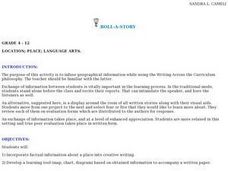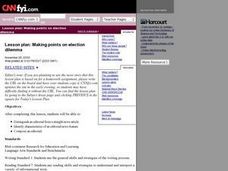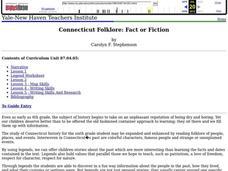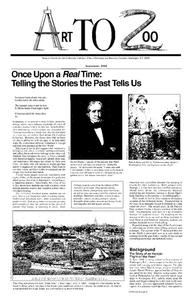Curated OER
Summarizing with Post It Notes
Students practice summarizing articles using post-it notes. They gather information for their own article and summarize it as well. They are assessed by their teachers and the quality of their notes.
Curated OER
Let's Sum It Up
Students summarize a selected piece of nonfiction text as a group. After reviewing the instructors preferred method for summarizing information by identifying the main idea and supporting details, groups write a summary paragraph of a...
Curated OER
Debate: Oregon's Death with Dignity Act
Students hold formal debate on the Death with Dignity Act. After researching information in the library, they record it on index cards. They prepare construction, cross examination, and rebuttal speeches.
Curated OER
Before We Travel, We Research
Young scholars conduct research on a historical site in preparation for a field trip. In small groups, they conduct research, and present the information to the class in the form of a PowerPoint presentation or poster.
Curated OER
Roll-A-Story
Students combine the use of geographical information and writing. They write a story and create a visual aid to be used when presenting to the class. They move to different stations deciding which topic they want to further research. ...
Curated OER
What Was It Like?
Students use the Internet to gather historical facts about the county in which they live. Using the information, they discover how to check it for accuracy and present their findings to the class. They write an essay about the history of...
Curated OER
Quest for Gold
Students identify people involved in the Olympics in the past and explain how their ideas and actions have changed others' lives. they take notes during research and present the information in written or picture format.
Curated OER
See How They Run
High schoolers analyze non-print campaign advertisements for factual and persuasive information. They choose the advertisement they think is the most persuasive and identify the reasons why it is the most persuasive.
Curated OER
Making Points on Election Dilemma
Students define a straight news article, and identify characteristics of an editorial news feature. They read a CNN article that examines the 2000 presidential election, and determine what is factual and what is opinion.
Curated OER
Whales
Write factual accounts, reports and express personal viewpoints about whales. They eill also write on a variety of topics related to whales, shaping ideas and making choices in language and form.
Curated OER
Introduce Others to a Woman Who Changed the World
Students research an important woman and share her story with others. The report can serve as a public service announcement to be read over the school public address system, or a short, informative speech delivered in one of your classes.
Curated OER
All About Titan and the Huygens Probe
Students examine the characterisitics of Saturn's largest moon, Titan. They discuss what they think is on Titan and what the Huygens probe can tell them about the moon. They write a summary about the information they gathered during...
Curated OER
Timely Tolerance
Eighth graders work together to focus on an oppressed group of society. Using the information they gather, they create a museum exhibit to educate their community on the group. They present their PowerPoint presentation to the class to...
Curated OER
Connecticut Folklore: Fact or Fiction
Sixth graders read legends to learn the history of Connecticut in a fun informative way.
Curated OER
Telling the Stories the Past Tells Us
Students create historical stories based on factual evidence. In this Telling the Stories the Past Tells Us lesson, students write historical stories using strategies such as characters, plot, setting, and voice. Students analyze several...
Curated OER
Once a fact, always a truth
Students discover there are many sources of accurate and inaccurate information. They use newspapers and, in small groups, develop a statement explaining why they believe the article is accurate or inaccurate.
Curated OER
Ecosystems Online
Learners work together to gather information on ecosystems from websites. They identify plants and animals and create their own website. They are graded on their willingness to work together and the content on the website.
Curated OER
History: Impact of the Lewis and Clark Expedition
Students formulate theories about the Lewis and Clark Expedition about its purpose and impact on America. They write position papers supported with facts discovered in their research. Students include quotes, factual references, maps,...
Curated OER
Books Are Great!
In this language arts worksheet, students read a short factual passage about books and authors. Students answer 6 questions about books.
Curated OER
Ancient Camel History "Cloze" Page
In this ancient camel history worksheet, students complete a cloze activity in which 7 words from a word bank are inserted into a factual text. This is to be used with an information handout that is not included here.
Curated OER
Itaipu Dam and Power Plant (Brazil and Paraguay)
Learners study South America's Itaipu Dam and Power Plant in order to gain an understanding that hydroelectric power is a major means of generating electricity throughout the world. They also look into the environmental impacts that...
Curated OER
Genetic Engineering
Students identify relationships between scientific concepts and their historical roots. They discuss and debate issues of ethics in science, specifically on the concept of genetic engineering and describe the processes of cloning and...
Curated OER
Scaling it Down: Caves Have Maps, Too
Measurement and map skills are the focus of this lesson, where learners crawl through a "cave" made out of boxes, desks and chairs, observing the dimensions. Your young geographers measure various aspects of the cave and practice math...
Student Achievement Partners
Laura Hillenbrand's "Unbroken" and Jeanne Wakatsuki Houston and James D. Houston's "Farewell to Manzanar"
Passages from Unbroken and Farewell to Manzanar provide the context for a study of the historical themes of experiencing war, resilience during war, and understanding the lasting trauma of war. Appendices include extension activities,...

























